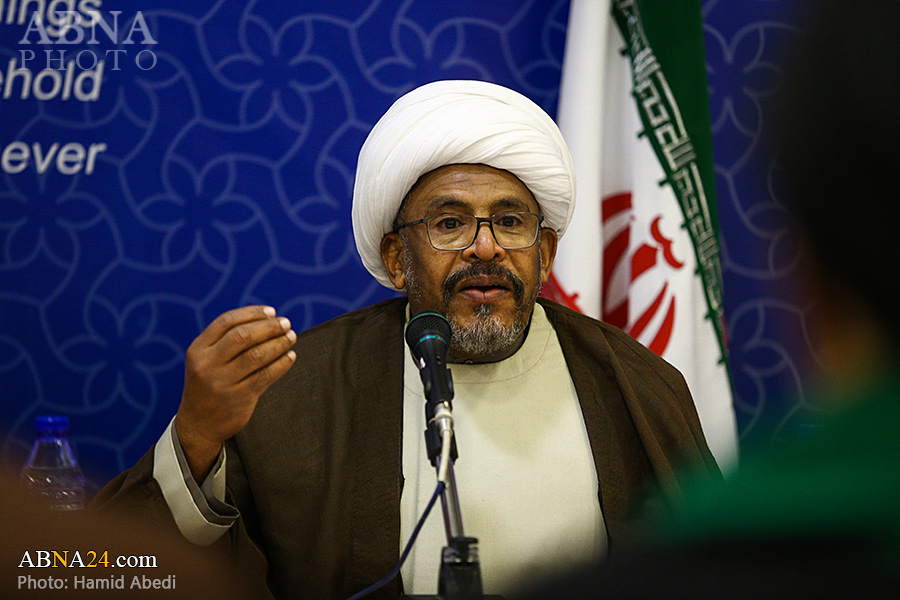Islam was brought to Sudan by the Shiites: Mu’tasim Sayed Ahmad
The Sudanese researcher stated, “Islam entered Sudan by Shia. The Arabian Peninsula as the cradle of Islam, has had very extensive relations with Sudan.”
ABWA Official Website – On Wednesday, January 4, 2023, on the sidelines of the “Lights of Guidance” exhibition the session “Shia in Sudan, latest cultural, political developments of the country” was held in Ghadir Hall of the Islamic Propagation Office of Seminary in Qom.
In this session, while referring to the background of Shia in Sudan, Dr. Mu’tasim Sayed Ahmad, a Sudanese researcher, stated, “Sudan has known Shia since a long time ago. Although there are no noble families known to be Shiites in this country, but the customs and culture of the Sudanese people show that Islam entered Sudan through Shiite Islam. Names like Baqer, Sadeq, Kazem and Fatimah are used by Sudanese people. But we rarely see that Sudanese people have named their children Muawiyah. Islam entered Sudan by Shia. The Arabian Peninsula as the cradle of Islam, has had very extensive relations with Sudan.”

“At the advent of Islam, Muslims migrated from Hijaz to Abyssinia, and today’s Sudan was part of ancient Abyssinia. Sudan is the country of palm groves, and those Muslims worked in that groves. Since the beginning of Islam, Shiites have been migrating due to the oppression of tyrant governments, and Sudan has been one of the destinations of these migrations. Especially since only the Red Sea separates Sudan from the Arabian Peninsula and Hejaz. Today, the distance between Jeddah and Sudan can be traveled by plane in just half an hour,” he continued.
“In the first centuries after Islam, migration from Hejaz to Sudan was due to the oppression of the Umayyad and Abbasid governments. Because of these migrations, there are now large families of Sadat (Sayyids, descendants of the Prophet and Imams) in Sudan. The Fatimid government of Egypt also relied on Sudanese warriors, and three popular uprisings against Saladin Ayyubi were carried out by the Sudanese,” the Sudanese researcher added.
“The folklore poems in Sudan have a Shiite flavor,” Mu’tasim Sayed Ahmad added, “Even in Sudanese poetry we see appeals to Imams and AhlulBayt (a.s.). These cases are the reason for the tolerance of the Sudanese with the Shiites, as well as their love for the AhlulBayt (a.s.).”
“The victory of the Islamic Revolution in Iran paved the way for Shia in Sudan, and then the tendency to Shia was seen especially among the young people active in the Sudanese Islamic movement. At one time, the Brotherhood ruled in Sudan, and Sudanese youth were influenced by the Shiite culture. After the arrival of Shiite missionaries from some Arab countries to Sudan, we saw the formation of Shiite populations in Sudan,” he added.
Shiite missionaries in Sudan behaved meticulously. Therefore, no tension provoking (and sectarian) events were observed in Sudan. Even the intelligence service of Sudan could not find a solid reason against the Shiites of this country. Several books have been published about the experience of Sudanese Mustabsirs who converted to Shia,” the Sudanese researcher added.
Referring to the greed of foreigners to Sudan, Mu’tasim Sayed Ahmad stated, “Sudan has abundant natural resources and water, and for this reason, some countries, like Saudi Arabia, have coveted Sudan. These countries had a negative position against the Shiites in Sudan. Therefore, in a period, we witnessed the activities of the intelligence services of Saudi Arabia and Egypt against the Shiites in Sudan. In the same period, Iranian embassy and Iranian cultural consultation had weak activities in Sudan.”
“Before the government of Omar al-Bashir were overthrown, he cut ties with Iran. After the people of Sudan revolted against al-Bashir and removed him from power, Iran did not even send a congratulatory message to the people of Sudan. This issue created negative positions among the revolutionary youth in Sudan towards Iran, and now they consider the Sudanese Shiites to be affiliated with the former government. In the meantime, the space for the activities of Saudi Arabia, UAE and Egypt in Sudan has become more open,” he continued.
“There is a need to study about the future of Shia in Sudan. There are many opportunities to spread Shia, but we do not use these opportunities. Propagating Shia in African countries is much easier than in Arab countries, and it is easy to invite hundreds, even thousands of people to the Shia school in these countries,” the Sudanese researcher added.
“Sudan is a vigilant country. This country is considered the key to Africa because it is an Arab country on the one hand, and an African country on the other. Sudan can be the gate of Shia in the African continent. Sudanese are respected in African countries and missionary opportunities are available in these countries,” Mu’tasim Sayed Ahmad stated.
“Jebhat al-Islam was an Islamist movement in Sudan that was divided into two parts, one was present in the former government of this country, and the other was active as an opposition to the government! Now there is a group called Islamic Movement in Sudan, which has no fans among the revolutionary youth. Also, Sufism and Wahhabism try to infiltrate these movements,” he continued.
“Sudan is now witnessing a political crisis, and the countries of Saudi Arabia, UAE and Egypt are interfering in Sudan’s internal affairs. The current rulers of Sudan seek to establish relations with the Zionist regime, and the United States also has influence in Sudan. Sudan is moving towards liberalism and secularism, and a pro-resistance government is unlikely to come to power in the country,” noted the Sudanese researcher noted.
It should be mentioned that on the establishment anniversary of the AhlulBayt (a.s.) World Assembly, the exhibition of the achievements of institutions and organizations active in the international propagation of Islam, entitled “Lights of Guidance” is being held from Saturday, December 31, 2022, until January Thursday 5, 2023, in the conference hall of the Islamic Propagation Office of the Seminary.
It is also worth noting that the AhlulBayt (a.s.) World Assembly was established on December 31, 1990, with the aim of gathering Shiites, establishing relationships within the Shiite world, promoting Shiites seminaries, solving the problems of Shiites with other Islamic Denominations, and benefiting from real and legal capabilities of Shiites.
The Assembly was established by the order of Grand Ayatollah Khamenei, the Supreme Leader of the Islamic Revolution, on December 25, 1990, with the aim of introducing the revolutionary foundations, and thought of the Islamic system of Iran to Shiites all over the world. /345/
The Sudanese researcher stated, “Islam entered Sudan by Shia. The Arabian Peninsula as the cradle of Islam, has had very extensive relations with Sudan.”
ABWA Official Website – On Wednesday, January 4, 2023, on the sidelines of the “Lights of Guidance” exhibition the session “Shia in Sudan, latest cultural, political developments of the country” was held in Ghadir Hall of the Islamic Propagation Office of Seminary in Qom.
In this session, while referring to the background of Shia in Sudan, Dr. Mu’tasim Sayed Ahmad, a Sudanese researcher, stated, “Sudan has known Shia since a long time ago. Although there are no noble families known to be Shiites in this country, but the customs and culture of the Sudanese people show that Islam entered Sudan through Shiite Islam. Names like Baqer, Sadeq, Kazem and Fatimah are used by Sudanese people. But we rarely see that Sudanese people have named their children Muawiyah. Islam entered Sudan by Shia. The Arabian Peninsula as the cradle of Islam, has had very extensive relations with Sudan.”

“At the advent of Islam, Muslims migrated from Hijaz to Abyssinia, and today’s Sudan was part of ancient Abyssinia. Sudan is the country of palm groves, and those Muslims worked in that groves. Since the beginning of Islam, Shiites have been migrating due to the oppression of tyrant governments, and Sudan has been one of the destinations of these migrations. Especially since only the Red Sea separates Sudan from the Arabian Peninsula and Hejaz. Today, the distance between Jeddah and Sudan can be traveled by plane in just half an hour,” he continued.
“In the first centuries after Islam, migration from Hejaz to Sudan was due to the oppression of the Umayyad and Abbasid governments. Because of these migrations, there are now large families of Sadat (Sayyids, descendants of the Prophet and Imams) in Sudan. The Fatimid government of Egypt also relied on Sudanese warriors, and three popular uprisings against Saladin Ayyubi were carried out by the Sudanese,” the Sudanese researcher added.
“The folklore poems in Sudan have a Shiite flavor,” Mu’tasim Sayed Ahmad added, “Even in Sudanese poetry we see appeals to Imams and AhlulBayt (a.s.). These cases are the reason for the tolerance of the Sudanese with the Shiites, as well as their love for the AhlulBayt (a.s.).”
“The victory of the Islamic Revolution in Iran paved the way for Shia in Sudan, and then the tendency to Shia was seen especially among the young people active in the Sudanese Islamic movement. At one time, the Brotherhood ruled in Sudan, and Sudanese youth were influenced by the Shiite culture. After the arrival of Shiite missionaries from some Arab countries to Sudan, we saw the formation of Shiite populations in Sudan,” he added.
Shiite missionaries in Sudan behaved meticulously. Therefore, no tension provoking (and sectarian) events were observed in Sudan. Even the intelligence service of Sudan could not find a solid reason against the Shiites of this country. Several books have been published about the experience of Sudanese Mustabsirs who converted to Shia,” the Sudanese researcher added.
Referring to the greed of foreigners to Sudan, Mu’tasim Sayed Ahmad stated, “Sudan has abundant natural resources and water, and for this reason, some countries, like Saudi Arabia, have coveted Sudan. These countries had a negative position against the Shiites in Sudan. Therefore, in a period, we witnessed the activities of the intelligence services of Saudi Arabia and Egypt against the Shiites in Sudan. In the same period, Iranian embassy and Iranian cultural consultation had weak activities in Sudan.”
“Before the government of Omar al-Bashir were overthrown, he cut ties with Iran. After the people of Sudan revolted against al-Bashir and removed him from power, Iran did not even send a congratulatory message to the people of Sudan. This issue created negative positions among the revolutionary youth in Sudan towards Iran, and now they consider the Sudanese Shiites to be affiliated with the former government. In the meantime, the space for the activities of Saudi Arabia, UAE and Egypt in Sudan has become more open,” he continued.
“There is a need to study about the future of Shia in Sudan. There are many opportunities to spread Shia, but we do not use these opportunities. Propagating Shia in African countries is much easier than in Arab countries, and it is easy to invite hundreds, even thousands of people to the Shia school in these countries,” the Sudanese researcher added.
“Sudan is a vigilant country. This country is considered the key to Africa because it is an Arab country on the one hand, and an African country on the other. Sudan can be the gate of Shia in the African continent. Sudanese are respected in African countries and missionary opportunities are available in these countries,” Mu’tasim Sayed Ahmad stated.
“Jebhat al-Islam was an Islamist movement in Sudan that was divided into two parts, one was present in the former government of this country, and the other was active as an opposition to the government! Now there is a group called Islamic Movement in Sudan, which has no fans among the revolutionary youth. Also, Sufism and Wahhabism try to infiltrate these movements,” he continued.
“Sudan is now witnessing a political crisis, and the countries of Saudi Arabia, UAE and Egypt are interfering in Sudan’s internal affairs. The current rulers of Sudan seek to establish relations with the Zionist regime, and the United States also has influence in Sudan. Sudan is moving towards liberalism and secularism, and a pro-resistance government is unlikely to come to power in the country,” noted the Sudanese researcher noted.
It should be mentioned that on the establishment anniversary of the AhlulBayt (a.s.) World Assembly, the exhibition of the achievements of institutions and organizations active in the international propagation of Islam, entitled “Lights of Guidance” is being held from Saturday, December 31, 2022, until January Thursday 5, 2023, in the conference hall of the Islamic Propagation Office of the Seminary.
It is also worth noting that the AhlulBayt (a.s.) World Assembly was established on December 31, 1990, with the aim of gathering Shiites, establishing relationships within the Shiite world, promoting Shiites seminaries, solving the problems of Shiites with other Islamic Denominations, and benefiting from real and legal capabilities of Shiites.
The Assembly was established by the order of Grand Ayatollah Khamenei, the Supreme Leader of the Islamic Revolution, on December 25, 1990, with the aim of introducing the revolutionary foundations, and thought of the Islamic system of Iran to Shiites all over the world. /345/





